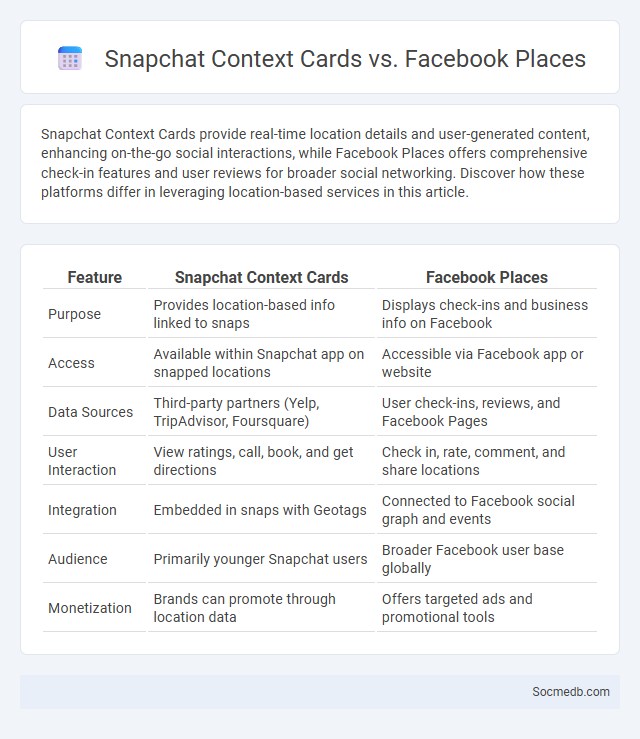
Photo illustration: Snapchat Context Cards vs Facebook Places
Snapchat Context Cards provide real-time location details and user-generated content, enhancing on-the-go social interactions, while Facebook Places offers comprehensive check-in features and user reviews for broader social networking. Discover how these platforms differ in leveraging location-based services in this article.
Table of Comparison
| Feature | Snapchat Context Cards | Facebook Places |
|---|---|---|
| Purpose | Provides location-based info linked to snaps | Displays check-ins and business info on Facebook |
| Access | Available within Snapchat app on snapped locations | Accessible via Facebook app or website |
| Data Sources | Third-party partners (Yelp, TripAdvisor, Foursquare) | User check-ins, reviews, and Facebook Pages |
| User Interaction | View ratings, call, book, and get directions | Check in, rate, comment, and share locations |
| Integration | Embedded in snaps with Geotags | Connected to Facebook social graph and events |
| Audience | Primarily younger Snapchat users | Broader Facebook user base globally |
| Monetization | Brands can promote through location data | Offers targeted ads and promotional tools |
Overview of Snapchat Context Cards
Snapchat Context Cards provide users with quick access to detailed information about locations, events, and businesses directly within the app. By tapping on a Snap, you can explore reviews, directions, operating hours, and even book reservations or rides, enhancing your overall social media experience. These cards integrate data from trusted partners like TripAdvisor and Foursquare, making your interactions more informative and seamless.
Introduction to Facebook Places
Facebook Places revolutionizes location-based social networking by allowing users to check in at various venues, share locations with friends, and discover popular spots nearby. This feature integrates seamlessly with Facebook's platform, enabling businesses to engage customers through geotagged content and personalized offers. By leveraging user-generated check-ins and reviews, Facebook Places enhances social connectivity and local discovery in real time.
What Are Context Cards?
Context Cards on social media provide detailed background information about topics, posts, or accounts to help users assess credibility and understand the subject matter more deeply. These cards often include links to verified sources, data summaries, and related content, enhancing transparency and reducing misinformation. By using Context Cards, you gain clearer insights, enabling informed decisions and a more trustworthy online experience.
Key Features Comparison
Social media platforms differ significantly in user interaction, content formats, and algorithmic focus, with Facebook emphasizing community groups and diverse media sharing, Instagram prioritizing visual content and influencer engagement, and Twitter centered on real-time news and concise text updates. TikTok's key feature is its short-form video format powered by a highly personalized AI-driven feed, contrasting with LinkedIn's professional networking tools and job search capabilities. Understanding these key feature distinctions helps businesses tailor their social media strategies to target specific audiences effectively across channels.
User Experience and Interface
Social media platforms prioritize intuitive user experience (UX) and seamless user interface (UI) design to enhance engagement and retention. Features like personalized content feeds, interactive elements, and streamlined navigation contribute to a more immersive and accessible environment. Continuous UX/UI improvements based on user behavior analytics drive higher satisfaction and platform loyalty.
Integration with Other Services
Social media platforms offer seamless integration with various third-party services, enhancing user experience and connectivity. You can link your accounts to e-commerce sites, streaming services, and productivity tools, allowing for streamlined sharing and management of content across multiple platforms. This interconnected ecosystem boosts engagement and simplifies your digital interactions by centralizing notifications and updates.
Business and Marketing Opportunities
Social media platforms offer unparalleled business and marketing opportunities by enabling targeted advertising and direct customer engagement. You can leverage data analytics and audience insights to create personalized campaigns that boost brand visibility and drive sales growth. Maximizing these tools transforms your social media presence into a powerful revenue-generating asset.
Privacy and Data Sharing Concerns
Social media platforms collect vast amounts of personal data, raising significant privacy and data sharing concerns among users worldwide. Many users are unaware of the extent to which their information is shared with third-party advertisers and data brokers, posing risks of data breaches and misuse. Enhanced privacy regulations like GDPR and CCPA aim to protect user data, but continuous vigilance and robust security measures remain crucial in safeguarding personal information online.
Pros and Cons Analysis
Social media platforms offer significant advantages such as enhanced connectivity, real-time communication, and vast opportunities for marketing and brand exposure. However, they also pose challenges including privacy concerns, misinformation spread, and potential negative impacts on mental health. Balancing these pros and cons is crucial for users and businesses aiming to maximize benefits while minimizing risks.
Which Contextual Platform Leads?
TikTok leads as the most impactful contextual social media platform by leveraging short-form video content tailored to user interests through advanced AI-driven recommendations. Instagram remains a dominant force due to its strong visual storytelling combined with contextual features like Stories and Reels for real-time engagement. Facebook maintains relevance by integrating contextual data across its vast user base, enabling highly personalized advertising and community-driven content.
 socmedb.com
socmedb.com